After seven years at the helm of GMHC, Kelsey Louie is stepping down to run The Door, a New York City group that provides services to youth.
“I started my social work career in youth services so it has always been a passion of mine,” Louie said in a phone interview with Gay City News. “The Door and Broome Street Academy I think is a leading — the leading — youth services organization… I’ve known about the Door for decades.”
Kishani Moreno, currently GMHC’s chief operating officer, will serve as interim CEO while the board sets a process for its search for a new chief executive, the agency said in a press statement.
During his tenure at GMHC, a leading HIV services organization, Louie has overseen “the expansion of programs to meet the ever changing needs of our communities” and the addition of supportive housing, comprehensive STD testing, mental health and substance services, and pharmacy services to the agency’s portfolio. Its Buddies program was revived. After a merger with ACRIA, GMHC expanded the services it provides to older adults with HIV. GMHC grew the services its delivers to transgender and gender non-conforming clients.
As important are the “intangible changes” at GMHC, Louie said. He recalled announcing the opening of a gender neutral bathroom to GMHC’s transgender and gender non-conforming clients only to have one client pound on a table and say “F*** bathrooms, we need jobs.”
“That taught me the importance of listening to people who need our services,” Louie said. The culture moved to one where “the consumers, the staff, and the board worked collaboratively and cooperatively. I conducted many conversations.”
In a 2016 interview, Louie set a number of goals for GMHC, including diversifying its funding. At the time, 54 percent of its annual revenue came from government contracts. An excessive dependence on government funding can create problems for non-profit and for-profit organizations should that funding be reduced or eliminated.
“We opened our mental health clinic to get third-party reimbursement,” Louie said. “We expanded our foundation and corporate support.”
GMHC was also among many non-profit groups across the state that joined the Plan to End AIDS. That plan was conceived by Charles King, the chief executive of Housing Works, an HIV services organization, and Mark Harrington, the executive director of the Treatment Action Group, and advocacy. Using a combination of anti-HIV drugs and supportive services to prevent the spread of HIV and to keep HIV-positive people healthy and unable to infect others, the plan sought to reduce the number of new HIV infections in New York to 750 in 2020. With most new HIV infections in the state occurring in New York City, the city set a goal of achieving 600 new HIV infections in 2020. Achieving these goals would mean that new HIV infections would eventually decline to lower numbers. Data from 2019 suggest that the goals will not be achieved, though the plan has met a number of other important goals.
“It was an ambitious goal to start with,” Louie said. “While I don’t think we’ll see the data from 2020 for several months, I don’t think we’ll achieve the initial goal of HIV infections of less than 750 for the state…I think there has been some progress.”
In New York City, the city and non-profits have struggled to reduce new HIV infections among Black and Latino gay and bisexual men for many years.
“I think we need to work harder at developing our prevention message by people of that population,” Louie said. “I think we need to include members of those groups.”
The Door was founded in 1972 and currently has an annual budget of $40 million. GMHC was founded in 1982 and has an annual budget of $28 million.
To sign up for the Gay City News email newsletter, visit gaycitynews.com/newsletter



































